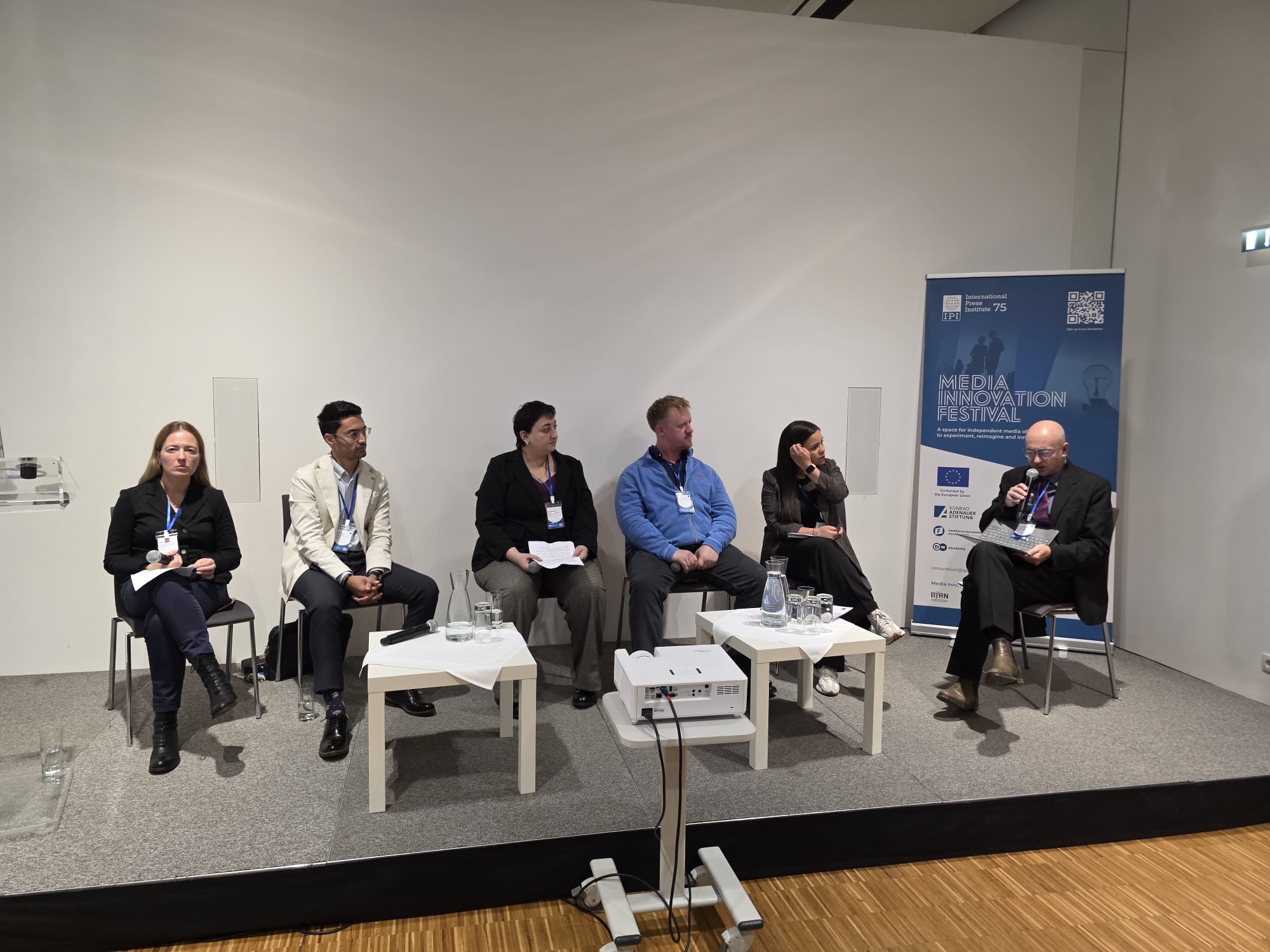PRESS RELEASE: Over 100 Media Workers Behind Bars in Russia and Belarus; 89 Arrested in Absentia

On the eve of the International Day to End Impunity for Crimes Against Journalists, the grim statistics sees 103 media workers in Russian and Belarusian prisons and penal colonies. Their combined sentence is over 740 years.
“Dissemination of fakes against the Russian army”, “propaganda of terrorism” and “participation in a terrorist organisation” are the Criminal Code articles most frequently used against the Russian journalists.
In Belarus, 28 media workers are currently serving prison sentences ranging from three to 14 years. At least 13 media workers are arrested in absentia for up to 20 years cumulatively. Among the most widespread criminal articles are “organisation of mass riots” and “harming national security”.
EVENTS

- On October 10, JFJ, in partnership with the Norwegian Helsinki Committee, hosted two side events during the Warsaw Human Dimension Conference: Exile Is Not Safety: Countering Transnational Repression of Journalists and Voices Behind Bars: Political Imprisonment Across the OSCE Participating States. The recording of the event can be found here. These events highlighted specific cases and patterns of transnational repressions targeting journalists and explored gaps in protection mechanisms at national and international levels.
- On October 20-21, JFJ participated in the annual ASOC Alliance Annual Safety Coordination Meeting in London, the UK. This annual event has been instrumental in fostering dialogue, collaboration and innovative solutions around journalist safety issues with a focus on freelancers, local journalists and under-resourced newsrooms.
- On October 21, JFJ attended the Trust Conference in London, the UK. The Conference brought together more than 700 world-leading experts, innovators, and activists who are tackling global challenges at the intersection of media freedom, technology, law, and responsible business practices.

- On October 23, JFJ participated in the annual Safety of Journalists Platform meeting in Vienna, Austria. The partners also met with OSCE Representative on Freedom of the Media Jan Braathu to discuss ways to strengthen media freedom and the safety of journalists in Europe.
- On October 23-25, JFJ participated in the World Congress and Media Innovation Festival in Vienna, where it also co-organised a panel, Beyond Survival: Supporting Impactful Journalism in Exile, featuring speakers from Azerbaijan, Afghanistan, Belarus, Russia and Nicaragua. The panel was moderated by EFJ’s General Secretary Ricardo Gutiérrez.
OPPORTUNITIES FOR JOURNALISTS

- On November 10-11, Rory Peck Trust will organise a two-part online training designed for journalists in exile who want to rebuild their visibility, voice, and professional presence through social media and short-form video. Spaces are limited. Priority will be given to active journalists working in exile who are currently developing their own reporting or storytelling projects. The application deadline is November 5. Apply here.
- The team behind 2404 Foundation (Daily Humanity) has launched MAIRA Labs, a venture dedicated to building AI-powered risk intelligence solutions for businesses, institutions and networks. It is designed to streamline and enhance risk monitoring, context reasoning, analysis, and assessment, allowing organisations to concentrate on their core objectives. Learn more about the project here.
- Deutsche Welle has opened applications for its journalism school, based in Bonn or Berlin. Applicants must have fluent English and at least B1-level German. After completing the programme, participants will have the opportunity to take up internships at DW offices around the world (including Washington, Brussels, Riga, and others). A scholarship is provided. The application deadline is 17 November.
- Free Russia Foundation is accepting applications for its fellowship programme aimed at Russian anti-war activists, journalists, researchers, and organisations based outside Russia. Project areas include journalism in exile, diaspora initiatives, support for political prisoners, and more. Applications are open until November 9, and a scholarship is provided. You can apply here.
- Journalists from across Europe, including Belarus and Russia, are invited to submit their best work to participate in the European Press Prize 2026. Five categories, each worth €10,000, celebrate journalism that informs, inspires, investigates, and makes an impact. Eligible entries must have been published between 1 December 2024 and 31 December 2025. Please submit your article in the original language, together with an English translation. Full details and the submission form can be found here. The application deadline is December 14.
- This year, Publix is awarding the Publix Tech Journalism Fellowship for the first time, a unique continuing education program that gives journalists the opportunity to deepen their knowledge in technology and media policy. Applications can be submitted until 15 November.
- The Pulitzer Center is seeking applications for its reporting initiative focused on AI and surveillance technologies and their impact on communities around the world. Full details and the submission form can be found here.
- The Fund for Investigative Journalism provides grants to help reporters produce high-quality, nonpartisan investigative stories that drive public impact. Grants are open to freelance journalists, staff reporters, and media outlets working across print, online, or broadcast platforms — including books, documentaries, and podcasts. The application deadline is January 2026. More information can be found here.
